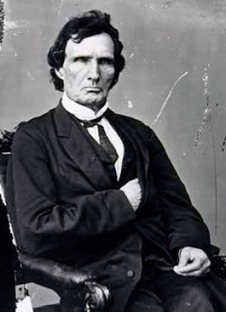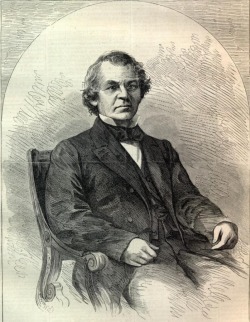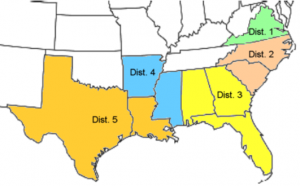Congress and Radicals Take Over

Thaddeus Stevens, a Radical Leader
As the Radicals took charge of Congress, they looked for a way to make the efforts of the War and Emancipation permanent.
July, 1868- 14th Amendment
4 Parts
1. Defined US Citizenship as all people born in US.
- States couldn't change rights of citizens.
- States couldn't deny citizens "equal protection of laws".
2. Any state that denied the right to vote to any male adult would have representation in Congress reduced.
3. Former Confederates forbidden from holding national or state office.
- Could hold office if pardoned by Congress
4. Validated National debt and repudiated Confederate debt.
- Adopted by both Houses and submitted for ratification to all states.
- Johnson could not veto Amendment.
- Johnson encouraged Southern Legislatures not to ratify it - Only 1 of 11 did
- Northerners no longer thought he was a Unionist seeking fair Reconstruction.
- Most thought of him as disloyal Southerner and former slave owner.
Fall, 1868- Johnson's Train Tour

Johnson took an 18 day train tour
When Congress passed 14th Amendment, Johnson claimed it went against his policies.
- Formed party combining Democrats and Conservative Republicans to support his policies called the National Union Party.
- Supported "immediate and unqualified" readmission of Southern states to Union.
- Before Congressional elections, Johnson took 18 day train tour through parts of America.
- Claimed 14th Amendment was illegal and defended himself as "a martyr pilloried by a Radical Republican Congress and a 'subsidized and mercenary press.' "
- Heckled by crowds at stops
- Got into shouting matches.
- Trip severely damaged his public image.
Fall, 1866-Congressional Elections
- Republicans won many victories
- Achieved majority of more than 2/3 in both Houses
- Johnson appeared to have lost popular support.

Congress took steps to limit Johnson's power
March, 1867- The Reconstruction Acts of 1867
- Radicals take charge of Reconstruction and pass multiple acts over Johnson's veto in 1 day.
- Eliminated Southern state governments
- Put under military rule
- Recreate systems of government while under army rule
- Register voters without regard to color
- Election by voters of delegates to send to state constitution convention
- Draft new state constitutions, which
- Ratify 14th amendment.
- Guarantee blacks' right to vote
- State would then be readmitted to Union and regain representation in Congress
Radicals wanted to limit Johnson's power so he couldn't interfere with Reconstruction Acts.
- Part of a new bill forbade President from giving orders to military governors in Southern states unless through General Grant.
- Tenure of Office Act forbid President from removing high-ranking officials from Administration without consent of Senate.
- Designed to protect Edwin Stanton (Secretary of War) who supported Congress' Reconstruction Plan.
- Congress pushing limits of its Constitutional authority.
- Legislative Branch had no established right to tell states how to conduct elections.
- Congress required states to ratify 14th Amendment to get back into Union.- Constitution requires 3/4 of states to voluntarily ratify amendments.
New Governments are Established

The 5 military districts in the South
- Southern states put into 5 military districts
- 5 governors and thousands of local officials removed from posts.
- State Constitutions that came out of conventions established - Universal male suffrage
- Systems of universal education
- Regulations to care for disadvantaged (for some states)
- White Southerners tried to prevent ratification of constitutions
- Boycotted polls
- Intimidated blacks to prevent them from voting
- Majority would not be reached
- Worked in Alabama so Congress removed majority requirement
- Eventually all Confederate states ratified state constitutions and 14th Amendment and were welcomed back into Union.




